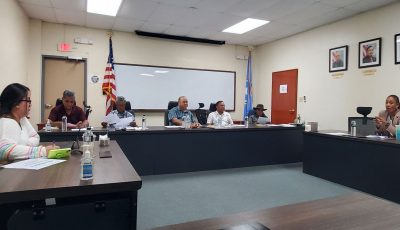$480K settlement in Turkish workers’ suit vs IPI
The parties in the lawsuit filed by a group of Turkish workers against Imperial Pacific International (CNMI) LLC for allegedly failing to pay them wages required under the Fair Labor Standards Act have reached a $480,000 settlement.
U.S. District Court for the NMI Chief Judge Ramona V. Manglona issued a 15-page decision order last Monday, approving an FLSA settlement between IPI’s former Turkish construction workers and the casino investor.
According to Manglona, as of last Monday, IPI paid a total of $480,000 to the plaintiffs’ attorney for the FLSA collective action claims, as well as attorney’s fees and costs.
“Because the plaintiffs’ counsel has received the full payment for the FLSA claims, the satisfaction of the FLSA judgment will be entered on the docket in this action,” said Manglona.
The Turkish workers who filed the FLSA suit against IPI back in 2020 are represented by attorney Richard Miller. The plaintiffs are Özcan Genç, Hasan Gökçe, Süleyman Köş, and 26 other unnamed Turkish workers.
The plaintiffs filed the complaint on behalf of themselves and other similarly situated H-2B workers who were recruited from Turkey in 2019.
According to the complaint, IPI kept sending its Turkish H-2B workers to the construction site to work for months on end without paying them on time, or at all, in violation of the FLSA.
When the workers walked out, IPI allegedly retaliated. Then, when they sued in federal court, IPI didn’t even come forward and defend itself.
The H-2B construction workers from Turkey—represented by Ozcan Genc, Hasan Gokce and Suleyman Kos—filed this lawsuit against IPI and IDS Development Management & Consultancy in the U.S District Court for the NMI last November 2020.
They claim they were forced to eat Chinese food (which reportedly violated prior guarantees that they will be served Turkish food), not paid the minimum wage and overtime, and were allegedly not paid their salaries for multiple payrolls. The workers also accused the defendants of retaliation for the workers’ protest actions.
IPI allegedly promised the Turkish workers that it would hire a cook who could prepare the kind of food suited to them. They were also promised above-minimum wage, substantial overtime pay, and roundtrip tickets.
However, the workers said the meals IPI gave them were Chinese food that were “practically inedible” for Turkish people so they ended up buying their own food and cooking for themselves. It was not immediately clear if their opposition to Chinese food was for other than the reason they cited in the complaint.
Aside from IPI allegedly breaking its promise to hire a cook that specializes in Turkish food, the group stated they also weren’t paid the wages they were promised.
When the workers stopped work on Sept. 11, 2020, for three weeks of protest, they said IPI stopped providing them drinking water and internet services at their barracks and stopped their access to company vehicles.



























